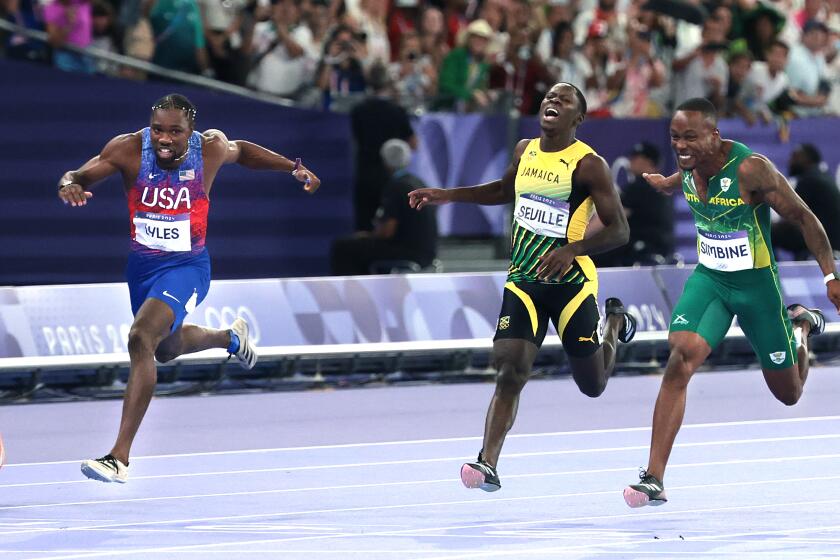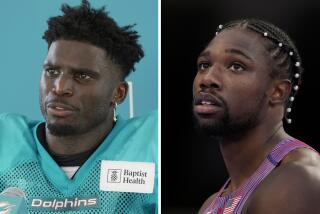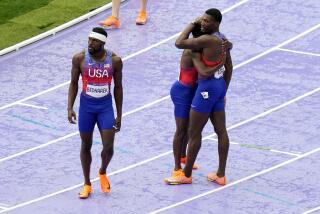Noah Lyles comes up short in Olympic men’s 200 meters while battling COVID
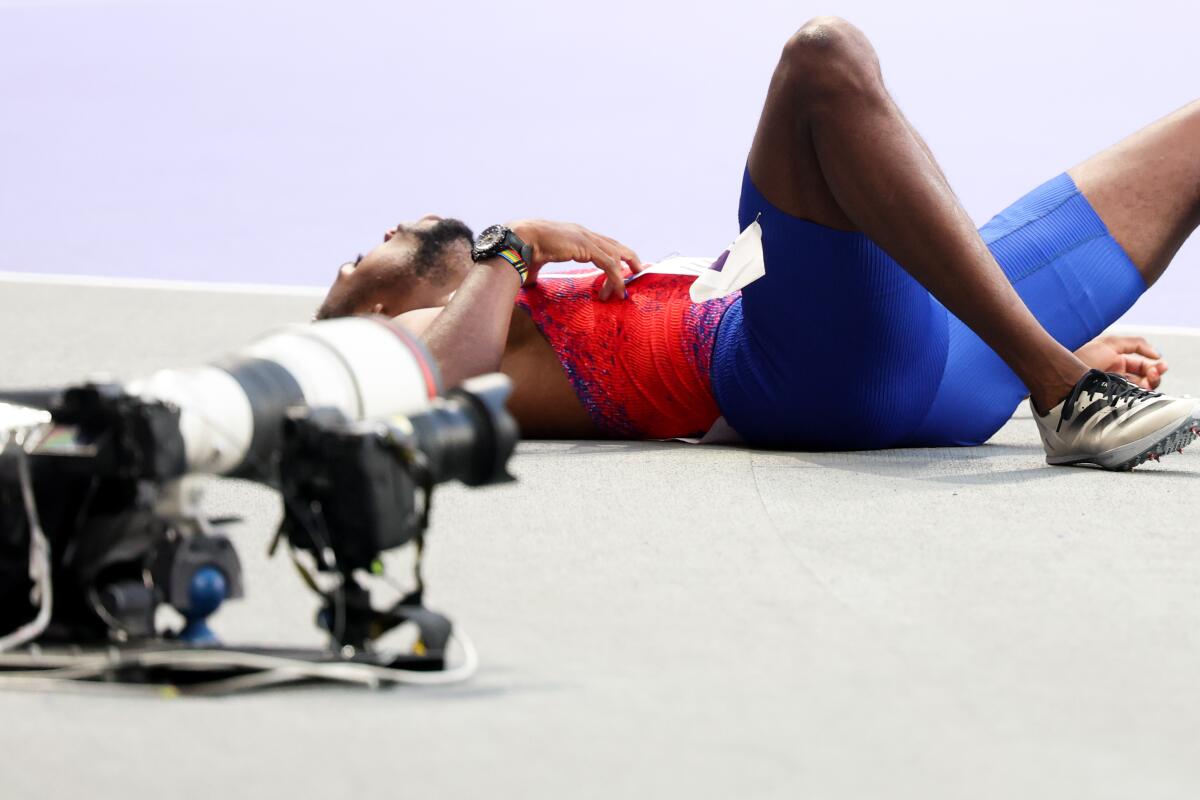
- Share via
SAINT-DENIS, France — Minutes after Noah Lyles collapsed on the track, medical personnel wheeled him down a long hallway, deep beneath the stands at Stade de France.
Someone asked if he wanted to call his mother. Lyles shook his head.
“I just needed some time,” he said. “So they wheeled me off the track.”
The world’s fastest man, it seemed, had been slowed by COVID.
Days after winning gold in a thrilling, historic 100 meters, a weakened Lyles struggled to finish third in his specialty, the 200, at the 2024 Summer Olympics. Letsile Tebogo of Botswana won his country’s first-ever gold medal with a time of 19.46 and Kenny Bednarek of the U.S. was second.
The 21-year-old Tebogo, a rising star in track, slapped his chest as he crossed the finish line.
“It was really a beautiful race for me,” said Tebogo, who recently lost his mother and had written her birth date on his shoes. “We had our ups and downs, but we just made sure that we pulled through and made it to the Olympics.”
Immediately after the men’s Olympic 100 meters finished, another race started, among officials, that decided Noah Lyles had earned Paris gold.
The result ended Lyles’ quest to win the 100, 200 and 400 relay — the coveted sprint triple last achieved by the legendary Usain Bolt. Unbeknownst to almost everyone, Lyle’s chances had taken a serious hit days beforehand.
The trouble arose early Tuesday morning, about 36 hours after his 100 victory.
“I woke up in the middle of the night just feeling really chills, aching, sore throat,” he said. “And those are kind of a lot of the symptoms I’ve always had right before getting COVID.”
A test came back positive and U.S. officials quietly moved him to a hotel outside the athletes village where he remained, taking Paxlovid, for the next few days. Only his coach and family knew the nature of his absence.
“Why would you want to tell your competitors you’re sick?” said Lyles, who joined British swimmer Adam Peaty and Australian swimmers Lani Pallister and Zac Stubblety-Cook among athletes who competed with COVID during the Olympics. “Why would you want to give them an edge over you?”
Because of relaxed health protocols at the Games, Lyles was allowed to continue training and competing in the early rounds of the 200. If he looked a bit off, that wasn’t too unusual — his 100 prelims had been lackluster.
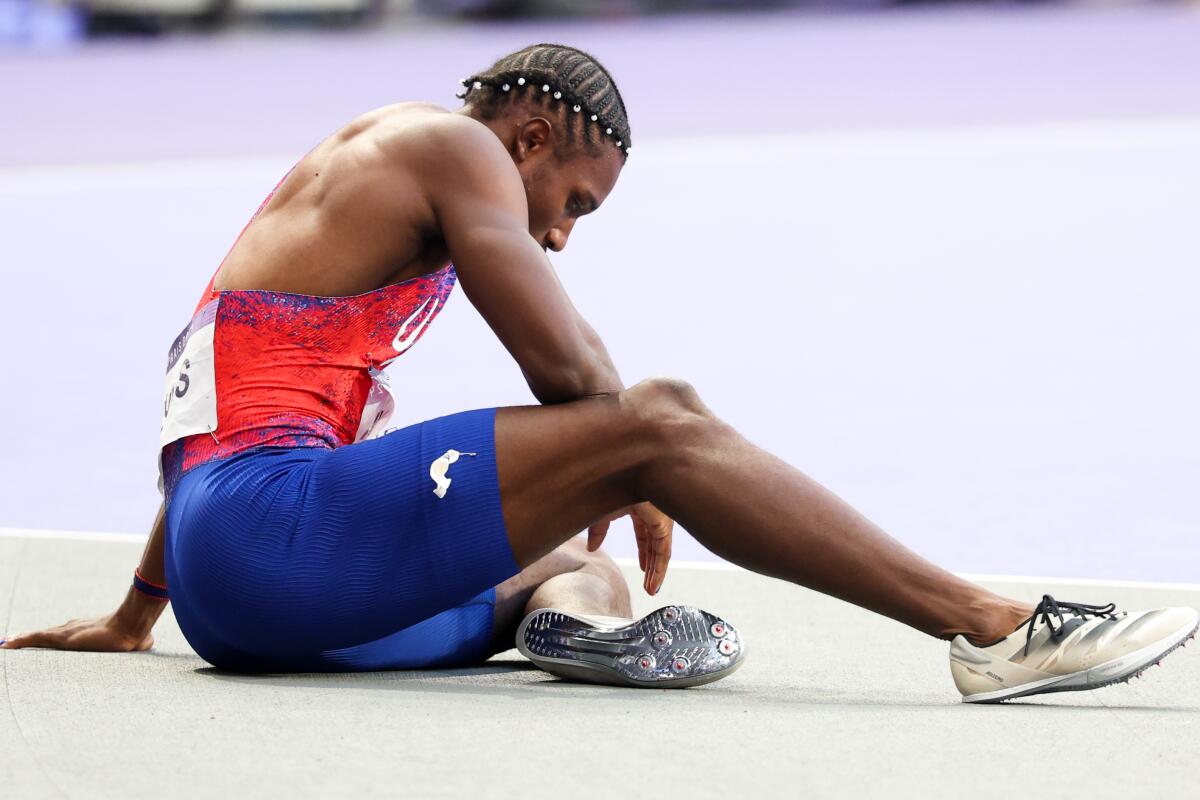
Though his girlfriend — Jamaican runner Junelle Bromfield — told him that he had been coughing all night, the symptoms seemed to fade by Thursday morning.
During introductions for the 200, Lyles burst onto the track like always, jumping up and down, pumping his fists. When the race began, he gambled on a fast start but could not muster the kind of finish that has carried him to victories in the past.
“It definitely affected my performance,” he said of the illness, estimating that he felt “like 90% to 95%” of full strength.
Tebogo, meanwhile, came off the curve looking strong. After seeing Lyles’ victory at the world championships last year, he had trained hard on that aspect of his race and was able to generate momentum to carry him down the home stretch.
Bednarek, wearing a trademark headband tied at the back, tried to follow but could not close the gap, repeating his silver-medal finish from three years ago in Tokyo.
“This race wasn’t what I wanted,” the American said, “but I’m happy to be back on the podium.”
Moments after the finish, Lyles sank down and lay on the track, fighting shortness of breath and chest pains. Medical staff brought him water and helped him to his feet before eventually taking him away in a wheelchair. His mother came down from the stands, chasing after him down that hallway.
Almost an hour later, the sprinter appeared before reporters wearing a black face mask. Withdrawing from the 200 had never crossed his mind, he said. As for running the relay on Friday, he would leave that decision to his coaches and teammates.
Considering his rough night, Lyles sounded surprisingly upbeat.
“To be honest,” he said, “I’m more proud of myself than anything, coming out and getting the bronze medal with COVID.”
More to Read
Go beyond the scoreboard
Get the latest on L.A.'s teams in the daily Sports Report newsletter.
You may occasionally receive promotional content from the Los Angeles Times.

